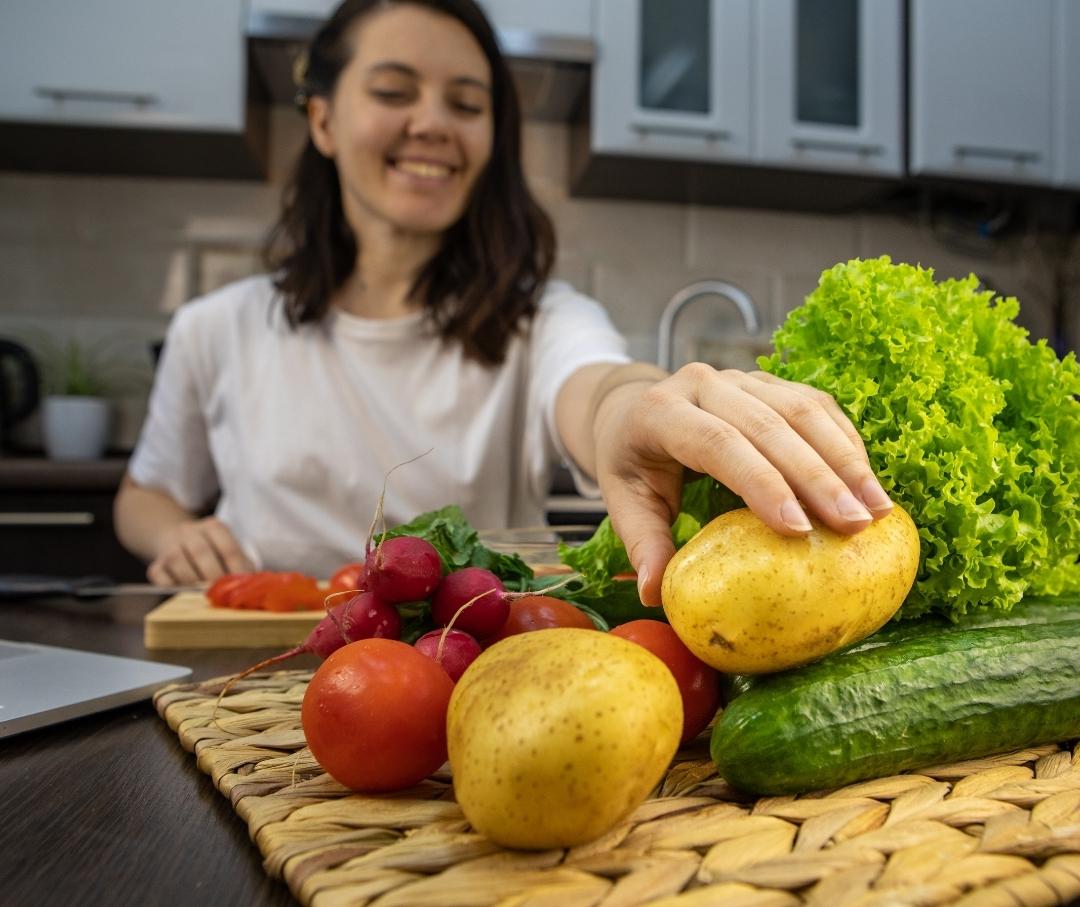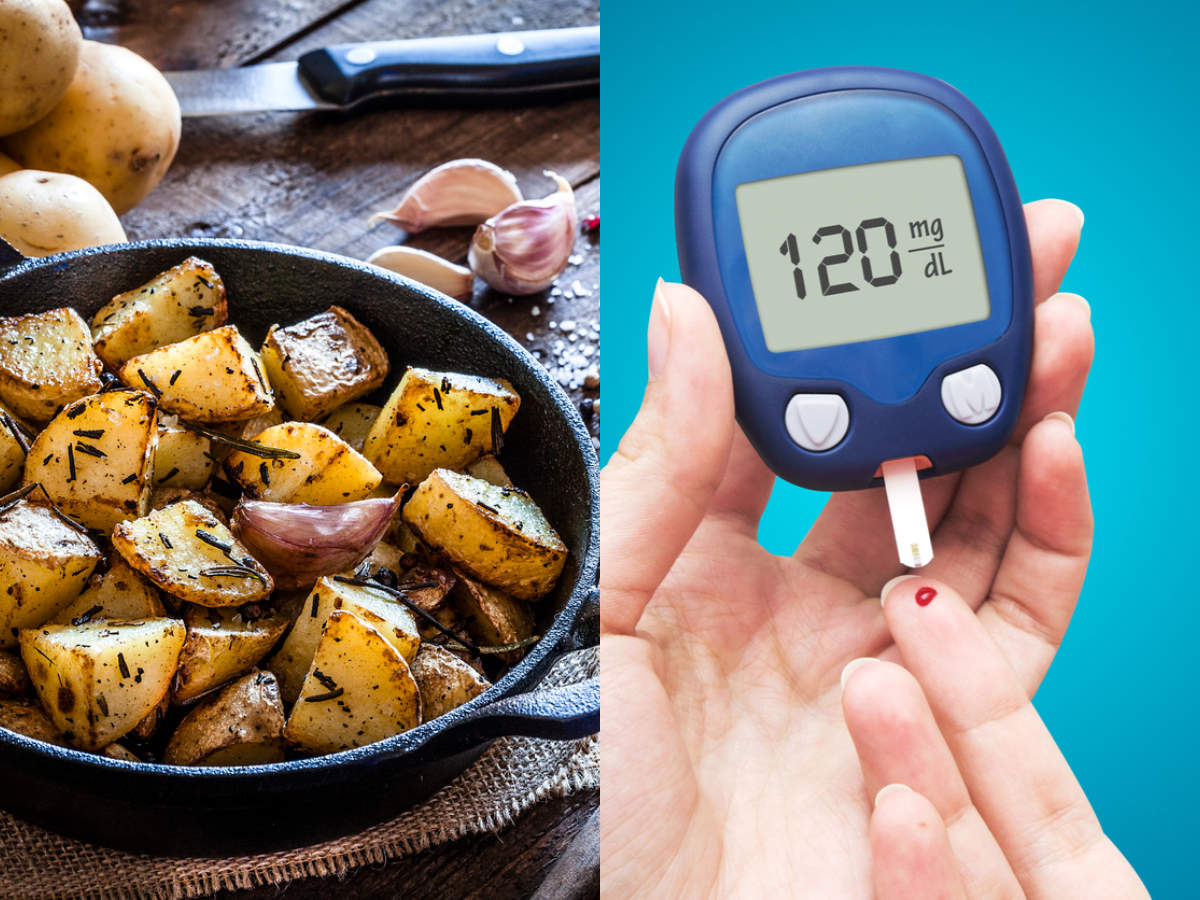People with diabetes can eat potatoes, and here we give tips on how to enjoy potatoes in a healthy way if you have diabetes.
Potatoes are hands-down one of the most popular vegetables consumed by Americans. In fact, it is estimated that almost 50 pounds of potatoes were consumed by each American in 2019, with french fries being the most common preparation.
Approximately 1 out of every 10 Americans has diabetes, and many may be wondering whether eating this popular, higher-carb vegetable is safe for this condition. Unfortunately, the answer to this question isn’t completely black-and-white. Any food that you are not allergic to is safe to enjoy in moderation on a diabetes-friendly diet. But just as there are various ways to prepare and enjoy these starchy spuds, there are nuances to how they affect someone who has diabetes.
To start understanding how people with diabetes can enjoy carbs like potatoes, we first need to understand what potatoes are and how eating them can impact blood sugar levels.
Potato Nutrition

As an underground-grown veggie that is accessible, affordable and extremely versatile, potatoes can be served in a multitude of ways, from crispy fried shoestrings to fluffy mashed side dishes to even creamy soups topped with bacon bits and chives. But on their own, potatoes offer up some pretty impressive nutrition.
One medium russet potato with the skin on contains:
- 168 calories
- 4 grams protein
- 0.2 grams fat
- 39 grams carbohydrates
- 3 grams fiber
- 1.83 mg iron (10% recommended daily allowance [RDA])
- 888 mg potassium (34% RDA)
- 12 mg vitamin C (16% RDA)
Potatoes provide a variety of important nutrients that we all need, including those with diabetes. But it is important to note that these veggies are quite high in the carbohydrate department. Not only are they rich in carbs, but potatoes are considered to be a high glycemic index food, meaning that the carbs are quickly absorbed by the body and may cause a blood sugar spike. This is why it’s important to enjoy more moderate portions of potatoes and to pair them with slower-digesting foods like non-starchy vegetables and protein.
How Potatoes Impact Blood Sugar

When a person has diabetes, they may not be able to absorb all of the carbohydrates that they consume, causing higher-than-desired blood sugar levels. For those without diabetes, when blood sugar levels rise, the pancreas is signaled to release insulin, which helps the cells in the body take up the blood sugar to use it for energy.
But in the case of diabetes, either a person’s pancreas is not producing insulin (as is the case in type 1 diabetes), or the cells are resisting insulin from doing its job (which is the case in type 2 diabetes). In any case, too much blood sugar stays in the bloodstream. Over time, that can damage blood vessels and cause serious health problems like heart disease, vision loss, and kidney disease.
That said, potatoes are a type of complex carbohydrates. This means they have more nutrients and more fiber (one russet has over 10% of your daily needs!) which help them be digested more slowly than simple carbs. Examples of simple carbs include packaged foods made with white flour, highly processed foods, naturally-occuring sugar and added sugar.
Carbs from varied sources are an important part of a balanced diet even if you have diabetes. The key is to moderate portion size, prioritize whole foods (like potatoes) and pair carbs with foods rich in fiber, protein and healthy fat to help slow down how quickly they’re absorbed in the body.
Can People With Diabetes Eat Potatoes?

Potatoes can absolutely be part of a diabetes-friendly eating pattern. But it’s important to note how the potatoes are prepared and the portion you consume, especially if you have diabetes.
First off, pair potatoes with other foods and enjoy them as part of a meal balanced with protein, fiber and healthy fat. One study evaluated people with type 2 diabetes who were assigned to consume dinner with either a boiled potato, roasted potato, a boiled potato cooled for 24 hours or basmati rice (which has a lower glycemic index than a potato). Each meal contained 50% carbohydrate, 30% fat and 20% protein.
Results showed no differences in post-meal blood glucose between all three potato-consuming groups. Plus, eating meals with boiled, roasted or boiled then cooled potato was not associated with unfavorable nighttime blood sugar control. A key takeaway from this study is that people ate potatoes alongside sources of fat and protein.
Tips for including potatoes in a healthy diabetes-friendly diet
:max_bytes(150000):strip_icc()/GettyImages-931333514-27a38c1ab9334f7a800447f30cb6462a.jpg)
“People with diabetes can still enjoy potatoes as part of a blood sugar-friendly eating pattern,” Mary Ellen Phipps, M.P.H., RDN, LD, and author of The Easy Diabetes Cookbook , shared. “We just need to think of them a bit differently than prior to diagnosis.” For example, a heavily-salted, deep-fried potato or a baked potato topped with ample high-saturated fat toppings like sour cream, cheese and bacon might not be the best choice for someone with diabetes who is trying to supprt a healthy heart.
Phipps reminded that “potatoes by themselves offer vitamins, minerals and some fiber… but not much in the way of protein or fat.” So, for those managing diabetes who want to enjoy potatoes, she suggests pairing them with a protein source like meat, fish or legumes and a healthy fat, like avocado or olive oil. Two of her favorite go-to combos are “a baked potato loaded with veggies and ground beef or a sweet potato topped with salmon and feta cheese”.
The Bottom Line

Potatoes on their own, served as deep-fried french fries, or loaded up with condiments that are rich in saturated fats like sour cream, butter and bacon bits may not be the best staple meal or side dish for a person with diabetes, though any food is OK in moderation. A serving of boiled or baked potatoes enjoyed with a balanced meal that contains protein and healthy fat is a flavor-packed and nutritious option, whether or not you have diabetes. For inspiration, try recipes like our Ground Beef and Potatoes Skillet or Stuffed Potatoes with Salsa and Beans. The carb-protein-fat combo will help you maintain balanced blood sugar levels while enjoying potatoes, too!
Source: https://www.eatingwell.com









